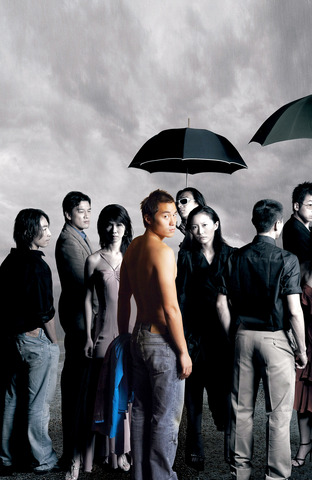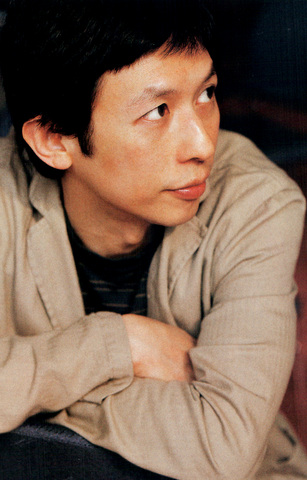Edward Lam (林奕華) questions everything. From democracy to the media, the fiercely independent thinker has made a career out of exploring the contradictions that he sees pervade all facets of society. But in person, Lam is far from bombastic or confrontational. Instead, he prefers to vent his displeasure in the newspaper articles he writes or the plays he directs.
"In terms of my personality, I am quite soft, but I can feel my anger from the things that I see, especially living in Hong Kong," Lam said in a recent interview.
He started writing at the age of 14 and has worked variously since the late 1970s in radio, TV and film and created the Edward Lam Dance Theater, which he founded while working and studying in Europe, in 1991.

Lam is pessimistic about Asian audiences' appreciation of theater. "Theater is very much treated like yogurt from a supermarket. You need it because you need it," he said. "It's not like you need it because you think it will stimulate you and you are not just consuming it."
A long-time collaborator of Mathias Woo from Hong Kong's Zuni Icosahedron, Lam has written and directed numerous plays that question, and are often critical of Hong Kongers' sensibilities and attitudes. Among them are Les Parents Terrible, Ideal School and the popular East Wing West Wing series. He is currently in Taipei directing the sold-out What Is Man? at the National Theater.
When Lam returned to Asia from Europe in the mid-1990s, he hit the theater scene with a number of productions that explored issues of sexual identity. In 1996, he used the word tongzhi (同志) — a term coined by Sun Yat-sen (孫逸仙) meaning 'comrade' — to refer to gays in Taiwan with the aim of fostering awareness of homosexual issues and solidarity. The issue of sexuality led him into a broader investigation of heterosexuality and its influence on the gay world.

"It was in '97 I had the feeling that I should not keep on doing gay-oriented theater because all the sufferings that the gays are sharing are based on [the ideology] of [heterosexuals]," he said. "Gay men are looking for men who are strong, who are masculine, who are wealthy, who are powerful. They are still looking for something very hetero in their lives."
If his earlier work takes homosexuality as the starting point, he now considers it important to address heterosexual culture because of its influence on gay culture. Lam says that because heterosexual culture is male-generated and thus male-oriented, it is imperative that gay artists investigate what it means to be homosexual in a culture largely dominated by heterosexual ideologies.
"We have everything from the center of man and we have to follow the rules laid by man. That is why you wouldn't have TV programs [or] newspapers that are based on gay culture. That is why I would take hetero as a center, rather than gay as a center. Every time you ask the question, who these man are, and if I am one of them, am I different, or if I am not, then why."
For Lam, one way of answering this question is to trace elements of identity back to classical Chinese literature, which he believes exerted a tremendous influence on ideas of masculinity in contemporary Chinese popular culture. "If you understand the ideology of [a] particular tribe or country, you will naturally understand what that culture is; because ideology is how they see things, how they value things, and what they think of what value is."
Whereas Lam's earlier work focused on contemporary society, history is playing an increasingly important role in his current work and how it shapes Chinese culture.
There seems to be a parallel between sexual identity and Hong Kong. When I mentioned how people in Hong Kong must have experienced a crisis of identity back in the nineties before the British returned the territory to Hong Kong, Lam redirected my observation by pointing out how citizens of Hong Kong don't have a framework within which to think about themselves as individuals.
"When you grow up in a place like Hong Kong you just don't think identity could become something like a crisis. You are not brought up [with] any sort of education to tell you that you have to think about who you are, you have to question yourself and the relationship between you and history. We simply don't have that concept of "what is history," so if you don't have that concept, how would you have the concept of who you are? You've got to have the idea of the bigger environment and then you try to find your position." The absence of this kind of reflection of history — where we are intimately tied up with its unfolding — is what he hopes audiences in Taiwan will think about when watching What Is Man?
Lam has a commitment with the National Theater Concert Hall to direct the Four Great Classical Novels of Chinese literature. He chose The Water Margin (水滸傳) — the inspiration for What Is Man? — first because it serves as a foundation for the other three. "I would say all four of these books are built on one important, key issue: What Chinese are like, no matter man or woman."
According to Lam, the four most important desires for man in Chinese culture are wine, sex, money and fame, all of which are included in The Water Margin.
By using texts from history to investigate contemporary society, Lam feels that the theater will be able to speak to audiences in a way that is different from movies or the Internet.
"With media like the Internet, people are looking for something immediate so time is everything. Speed is everything. Theater is totally different. It requires patience. It requires depth. The influence of the theater nowadays is so limited because it is not a media thing. Anything that is not connected to making money — mainly media — will [have] less influence."
And though Lam is not overly optimistic about the ability of theater to reach a wide audience, he believes the stage still retains the kind of independence necessary to ask the difficult questions neglected by the popular media.

May 26 to June 1 When the Qing Dynasty first took control over many parts of Taiwan in 1684, it roughly continued the Kingdom of Tungning’s administrative borders (see below), setting up one prefecture and three counties. The actual area of control covered today’s Chiayi, Tainan and Kaohsiung. The administrative center was in Taiwan Prefecture, in today’s Tainan. But as Han settlement expanded and due to rebellions and other international incidents, the administrative units became more complex. By the time Taiwan became a province of the Qing in 1887, there were three prefectures, eleven counties, three subprefectures and one directly-administered prefecture, with

Taiwan Power Co (Taipower, 台電) and the New Taipei City Government in May last year agreed to allow the activation of a spent fuel storage facility for the Jinshan Nuclear Power Plant in Shihmen District (石門). The deal ended eleven years of legal wrangling. According to the Taipower announcement, the city government engaged in repeated delays, failing to approve water and soil conservation plans. Taipower said at the time that plans for another dry storage facility for the Guosheng Nuclear Power Plant in New Taipei City’s Wanli District (萬里) remained stuck in legal limbo. Later that year an agreement was reached

What does the Taiwan People’s Party (TPP) in the Huang Kuo-chang (黃國昌) era stand for? What sets it apart from their allies, the Chinese Nationalist Party (KMT)? With some shifts in tone and emphasis, the KMT’s stances have not changed significantly since the late 2000s and the era of former president Ma Ying-jeou (馬英九). The Democratic Progressive Party’s (DPP) current platform formed in the mid-2010s under the guidance of Tsai Ing-wen (蔡英文), and current President William Lai (賴清德) campaigned on continuity. Though their ideological stances may be a bit stale, they have the advantage of being broadly understood by the voters.

In a high-rise office building in Taipei’s government district, the primary agency for maintaining links to Thailand’s 108 Yunnan villages — which are home to a population of around 200,000 descendants of the Chinese Nationalist Party (KMT) armies stranded in Thailand following the Chinese Civil War — is the Overseas Community Affairs Council (OCAC). Established in China in 1926, the OCAC was born of a mandate to support Chinese education, culture and economic development in far flung Chinese diaspora communities, which, especially in southeast Asia, had underwritten the military insurgencies against the Qing Dynasty that led to the founding of